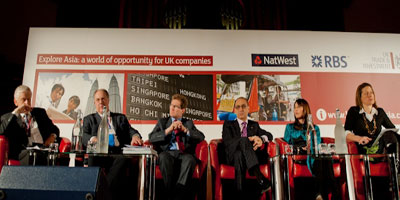28th February 2012
Riding with entrepreneurs – business the Indian way

At the Asia Task Force (ATF) seminars around the UK earlier in February, business speakers, my colleagues and I tried to give some steers to companies new to doing business in India. Inevitably, in a country of 1.2 billion people, and with a business audience covering everything from capital equipment to smoked salmon and spa treatments, it is impossible to avoid generalisations. But hopefully the following distills a little of the advice we gave, and importantly, we heard in discussions with the 500 or so businesspeople who attended the workshops.
Forming a partnership:Most companies, even if eventually they will want to do it alone in India, will need to start with some form of partnership, whether as a joint venture, an agency or distribution arrangement, or manufacturing-under licence. Finding the right partner is not easy – even UK household and high street names stumbled on their first entry – and this is one area where our team can sometimes give most assistance. Our sector teams can make suggestions for possible partnerships, and if necessary accompany a first-time visitor.
Going to or towards the top: When seeking a partner, firms need to ensure they are talking to someone in a senior position in an Indian company, able to take the decision to form an agreement. India can be hierarchical, and for example one finance director described how any email she sent to her counter-part was always replied to with a copy to her managing director! Decisions tend to get pushed upwards, even in some of the biggest corporations, so UK businesspeople need to satisfy themselves that any agreement has the backing at the top of an organisation.
Understanding the family: Many companies discovered that their Indian counter-parts were run as a family business. More often than not Indian companies have had, or will in the future, strong family connections. This holds true for some of the largest corporations, as well as SMEs. For example BP’s business partner, in a colossal $7bn deal to share exploration and marketing of offshore gas fields, is Reliance Industries, whose CEO, Mukesh Ambani, is the son of the original founder. So understanding how the family in India provides a form of stability and structure within a company can be invaluable, as well as thinking about succession issues and their potential influence on a partnership.
Tolerating the bureaucracy: You sometimes hear the claim, or the boast, that Britain bequeathed a strong bureaucracy to India. Others would say that it is so strong that it hasn’t changed that much, and new visitors to India can certainly find the form filling a trial. There are no short cuts, although a business partner who is used to the demands of various government departments can help ease the burdens. But on some occasions, for example when a foreign company decides to appoint an ex-pat to their Indian office, visits to the FRRO (Foreigners Regional Registration Office) are just a regular part of the business cycle every six months.
Avoiding corruption: Many UK companies at the seminars underlined the paramount importance of following carefully the requirements of the UK’s new anti-corruption laws, which apply as much overseas as in Britain. Indian and British speakers made it clear that, as the media have exposed, there have been some high level cases of alleged corruption within Indian bureaucracy and business. But they also stressed that it was quite possible for a UK company, multi-national or SME, to play by the book and not be adversely disadvantaged. The best advice was simply, always, to say no.
Riding with entrepreneurs: Everyone who spoke at the seminars underlined the acute and well-focused entrepreneurial drive of Indian business. The disadvantage of this was that Indians would drive as hard a bargain as any businessperson anywhere. But, once the deal has been struck, the entrepreneurial flair of so many Indians, from the top, Forbes-listed CEOs to the new IT start-up by a 27 year-old arranging for goods to be delivered by hand to customers across the country, could enable a UK partner to ride the crest of a powerful wave of business across what is becoming one of the world’s largest economies.